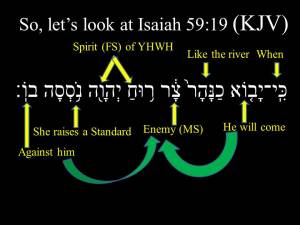The pertinent part of Isaiah 59:19 reads in the King James Version, “When the enemy shall come in like a flood, the Spirit of the LORD shall lift up a standard against him.”
Isaiah 59:19 is one of the most oft quoted texts in Scripture, memorized thus even by those who don’t read the King James Bible… which is unfortunate because Isaiah 59:19—a favorite for spiritual warfare aficionados—is also one of the most altered translated texts across the versions.
In fact, the rendering of Isaiah 59:19 in other translations is so altered from the KJV that many read it and interpret it in context in other version, only to quote it from memory in the KJV without even realizing that they are supposed to be the same verse.
Compare the same part of the verse in the NASB “For He will come like a rushing stream which the wind of the Lord drives.”
NIV? “For he will come like a pent-up flood that the breath of the Lord drives along.”
ASV? for he will come as a rushing stream, which the breath of Jehovah driveth.
LXX? “for the wrath of the Lord shall come as a mighty river, it shall come with fury.”
ESV? “for he will come like a rushing stream, which the wind of the LORD drives.”
RV? “for he shall come as a rushing stream, which the breath of the LORD driveth.”
I could go on, but you get my point.
One would imagine that these translators are looking at different Hebrew texts or are confronting major text critical issues… Not so.
So, what went wrong?
The initial confusion is over the proper antecedent to the pronoun in “he will come.”
WARNING!!! I AM ABOUT TO GET A LITTLE GRAMMAR TECHNICAL. So, take a Dramamine, breath deep for a few seconds, then wade in and try to stay with me for just a bit. Take it one step at a time and re-read if necessary. 10 Quick facts about Pronouns and their antecedents.
- A pronoun’s Antecedent is the noun which a pronoun represents.
- If “He did it,” then the antecedent to “He” is the one who did it, whoever “He” may be… Rufus Xavier Sarsaparilla perhaps. (Look him up on YouTube and have a good laugh on me.)
- “He” tells you to look for a single male person or thing to blame or thank for doing it, because almost all English pronouns have number (singular or plural) & natural gender.
- Natural gender in English speaks of something as Male, Female, or an object without sexual distinction. (Joke deleted to avoid offense.)
- Hebrew pronouns, however, have natural gender when speaking of people or animals, and another thing called grammatical gender when speaking of things without sexual distinction.
- Grammatical gender speaks of spelling patterns that exist in many languages that break all nouns into classes. Hebrew has only two—Masculine and Feminine. There is no IT in Hebrew.
- Now grammatical gender is not about the mannishness or womanishness of things, but merely a way of classifying spelling patterns for nouns.
- In English we don’t have any masculine or feminine or neuter spellings for nouns unless they specifically reference men or women.
- Like… King, Queen, Prince, Princess, Actor, Actress, Waiter, Waitress, Mister, Miss, Madame, Hero, Heroine.
- We even have words that are gender specific without particular spelling patterns, like Stallion, Mare, Fox, Vixen, Stag, Doe, Cow, Bull, Cad, Rake, Slut & Sleaze (but not sleazy… men or women can be described as sleazy).
- In Greek & Hebrew, males & females do get natural gender, but every other noun has grammatical gender without thought of natural gender.
- Grammatical Gender is part of a system of association & agreement.
- In Greek & Hebrew all Nouns & Pronouns have gender & number & all verbs have pronouns.
- All Pronouns (including those in verbs) connect & agree with the nouns they reference & represent.
- Remember, Hebrew has only Masculine & Feminine spelling patterns, while English recognizes nothing but Males, Females & Objects.
- This puts our translations at a disadvantage when trying to represent the Hebrew text.
- Pronouns can get tricky.
- Hebrew has considerably more pronouns than English.
- Hebrew Pronouns have a more flexible association than in English.
- Pronouns have looser rules of association than in English.
- Thus, Pronoun Antecedents become a big deal when interpreting Scripture. Never assume an antecedent… Investigate possibilities.
Now, let’s begin to consider the pronouns and antecedent possibilities in Isaiah 59:19. Today, we’ll consider the KJV take on things… later, we’ll consider the others… still later I’ll evaluate the whole context for a solution.
So, in Figure #1 we see that the Hebrew is rendered by the KJV, “When he comes / as a stream / the enemy / spirit of YHWH / she raises a standard / against him.”
KJV guys have made the antecedent to the pronoun in the verb “he comes” the term after the comparative “as a stream”—the word “צָ֔ר TSAR” translating it “The enemy.”
There are two immediate problems with this, rendering.
The first problem is that the translation THE enemy is false. The text has no THE in it. It simply reads, “AN enemy.” This wouldn’t be a major deal save for those who take THE enemy not as a category [like, THE Dog is a loyal animal.] but, rather as a designation for SATAN.
The second problem is that צָ֔ר is spelled by the Hebrew scribes NOT as the noun for enemy, but as an adjective or participle “narrow” making it an adjective modifying “river.” (The Hebrew vowel under the first letter from the right is a T… long A)
Enemy is usually spelled צַר. (The Hebrew Vowel under the first letter from the right is a —…short A). Yes, this matters.
Once the KJV translators attached the Masculine singular pronoun in “he shall come” to צָ֔ר as “The Enemy,” however, everything else must be made to fit even if it fits poorly… leading to a third problem.
This forces the term נֹ֥סְסָה nosesah to mean “raise up a banner,” because the Spirit of the LORD must be responding in some way to this enemy… right? Unfortunately, this would be an impossible word form for a hitherto unknown verb “raise up a banner” demanding that we completely ignore both the Hebrew Scribes and the Greek translators for the LXX.[1]
Thus, the KJV translation, while not impossible, has definitely given us some reasons to doubt their rendering.
In our next post, we’ll consider the other translations
[1] Scholars challenge the Hebrew Scribes frequently, so this does not invalidate their suggestion automatically.
Discover more from Biblical Literacy with Dr. Andrew D. Sargent
Subscribe to get the latest posts sent to your email.



